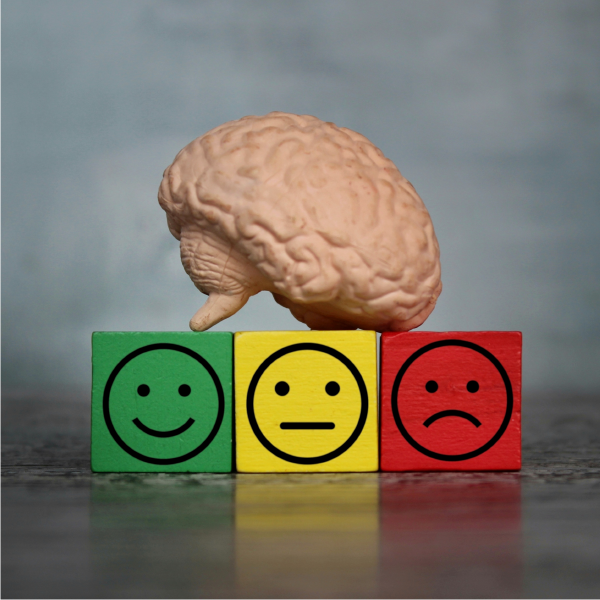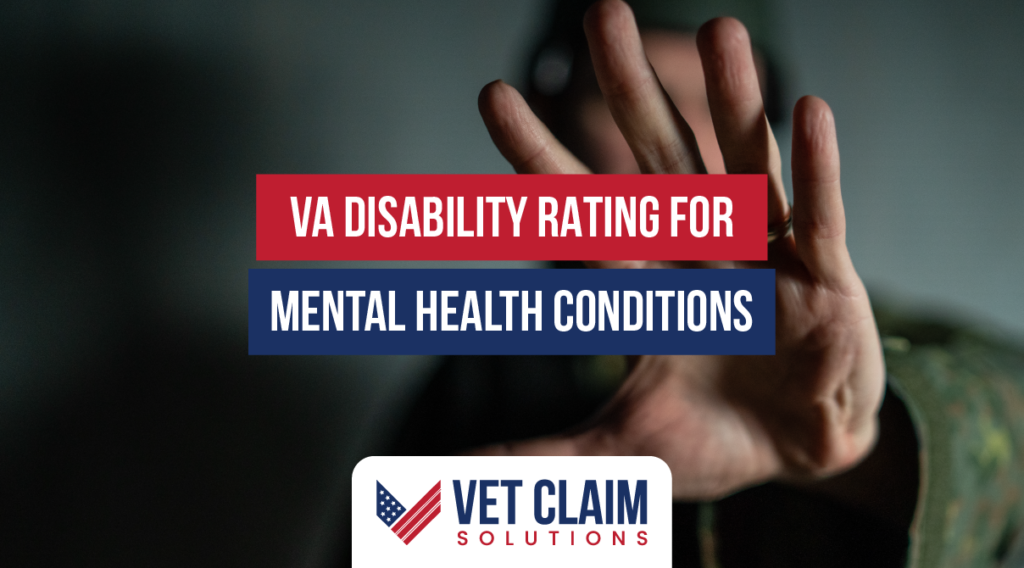As we celebrate PTSD Awareness Month in June, it is critical to understand the complexities of mental health not only during this special month but every day of the year. For many veterans, the battle does not end on the battlefield but continues in the form of mental health issues that can have a long-term impact on their lives. These invisible wounds can be difficult to understand and navigate, but the VA provides disability ratings to recognize and support veterans facing these challenges.
In this blog, we will look at the VA disability rating system for mental health conditions, explaining how it works and providing a better understanding of the benefits available to veterans. We hope that this information will reach out to veterans and their loved ones, providing guidance and support on their path to healing and well-being.

Each section will provide valuable insights and information that can assist veterans in understanding their options and taking the necessary steps to receive the support they deserve. We believe that by sharing this knowledge, we can help ease the burden and provide a path towards a brighter future.
So, let us embark on this journey together, uncovering the intricacies of the VA disability rating system for mental health conditions. May this blog serve as a guiding light for veterans and their families, offering hope, understanding, and compassion as we navigate the path towards healing and well-being.
What mental illnesses qualify for VA disability?
The Department of Veterans Affairs (VA) recognizes several mental health conditions as eligible for disability benefits. These conditions include:

- Anxiety disorders such as panic disorder
- Trauma and stress-related disorders like post-traumatic stress disorder (PTSD)
- Psychotic disorders such as schizophrenia
- Cognitive disorders
- Eating disorders like anorexia or bulimia,
- Mood disorders, including major depressive disorder
- Residual effects of traumatic brain injuries (TBI).
It’s important to note that each case is evaluated individually, and eligibility for VA disability benefits depends on factors such as the severity of the condition and its impact on the individual’s ability to function in daily life.
How does VA evaluate Mental Disorders?
The evaluation of mental disorders by the VA follows the General Rating Formula for Mental Disorders, which determines the disability rating based on the severity of the condition. Here is an overview of how mental disorders are evaluated:

Rating Scale:
The disability rating scale for mental disorders ranges from 0% to 100%, with specific ratings of 0%, 10%, 30%, 50%, 70%, and 100%. Unlike some other disabilities, mental health disorders are not rated in 10% increments.

Occupational and Social Functioning:
The VA considers the impact of the mental disorder on the individual’s occupational and social functioning. The rating considers the level of impairment caused by the condition in terms of the ability to work and engage in social activities.

Symptom Severity:
The severity of symptoms associated with the mental disorder is also assessed. This includes evaluating the frequency, duration, and intensity of symptoms such as anxiety, depression, cognitive impairment, or hallucinations.

Continuous Medication:
The need for continuous medication to manage the mental disorder is considered. If the symptoms necessitate ongoing medication, it can contribute to a higher disability rating.

Total Occupational and Social Impairment:
A 100% disability rating is assigned when the mental disorder causes total occupational and social impairment. This means that the individual’s ability to work and participate in social activities is severely impacted.
It’s important to note that the specific criteria for each rating percentage can vary based on the individual mental disorder and the evidence provided. The evaluation process considers medical records, treatment history, and other relevant documentation. It is recommended to provide thorough and accurate information to support the severity of your mental disorder when filing a claim with the VA.
How much can I receive in VA benefits for my mental illness?
The amount of VA benefits you can receive for your mental illness depends on the severity of your condition, as determined by the VA’s disability rating. Here are the current monthly VA disability compensation rates (as of December 1st, 2022) for mental illnesses:
| RATING | MONTHLY COMPENSATION |
| 0% | $0 |
| 10% | $165.92 |
| 30% | $508.05 |
| 50% | $1,041.82 |
| 70% | $1,663.06 |
| 100% | $3,621.95 |
The VA disability compensation is designed to provide financial support to compensate for the impact of your mental illness on your ability to work and function in daily life. The severity of your condition and its resulting impact will determine the specific rating and benefit amount you receive.
Which Mental Health Conditions Do Not Qualify for VA Disability Benefits?
While many psychiatric conditions are eligible for VA disability benefits, certain mental health conditions do not qualify due to their nature and relationship to military service. These conditions include:
Personality Disorders:
Personality disorders are characterized by long-standing behavioral patterns that do not change over time. As such, they are not considered to be caused by military service.

Substance Use Disorder:
The VA does not grant direct service connections for substance use disorder. However, veterans can be service-connected on a secondary basis if the substance use disorder arises from a service-connected condition. For instance, if a veteran develops liver cirrhosis due to alcohol use as a coping mechanism for symptoms of PTSD, they may be eligible for disability compensation for the liver condition as secondary to PTSD.

Impulse Control Disorder:
Impulse control disorders involve difficulty resisting impulses or urges, leading to impulsive and often harmful behaviors. These disorders are generally not considered to be related to military service.

Cognitive Delays and Developmental Disabilities:
Conditions characterized by cognitive delays or developmental disabilities are typically not attributed to military service. These conditions are typically present from birth or early childhood and are not considered to be caused by military experiences.

It’s important to consult with the VA or a qualified representative to understand the specific eligibility criteria for VA disability benefits and how they apply to individual circumstances.
VA Mental Health Ratings
Regarding VA mental health ratings, different percentages reflect the severity of your condition and its impact on your daily life. Here are the general rating levels and some symptoms associated with each:

To qualify for a 100% mental health VA rating, your symptoms must be extremely severe and significantly impact your ability to function in daily life.
Some examples of symptoms that meet the criteria for “total occupational and social impairment” include:
- Severe impairment in your thought processes or communication makes expressing yourself or understanding others difficult.
- Experiencing prolonged delusions or hallucinations that greatly disrupt your perception of reality.
- Engaging in grossly inappropriate behavior that is out of touch with social norms and poses a risk to yourself or others.
- Being persistently in danger of causing harm to yourself or others due to your mental health condition.
- Inability to independently take care of your basic personal hygiene, such as bathing, grooming, and maintaining cleanliness.
- Experiencing confusion about your current time and location makes it challenging to orient yourself in familiar or unfamiliar surroundings.
- Memory loss to the extent that you struggle to recall the names of close relatives, your job, or even your name.
Please note that delusional thoughts, hallucinations, and grossly inappropriate behavior are only some examples of symptoms warranting a 100% mental health VA rating. Your condition’s overall severity and impact on your ability to function independently and maintain social and occupational functioning are key factors in determining the rating level.

To qualify for a 70% mental health VA rating, veterans must demonstrate significant difficulties in multiple areas, including work and social interactions.
Some examples of symptoms that meet the criteria for a 70% rating include:
- Suicidal ideations indicate persistent thoughts of self-harm or suicide.
- Engaging in obsessive rituals that disrupt routine activities, such as compulsive skin picking or constantly checking windows and doors.
- Speech that is illogical, obscure, or irrelevant makes it challenging to communicate effectively.
- Experiencing constant panic or depression that significantly impairs the ability to function independently and appropriately.
- Lack of impulse control leads to impulsive and potentially violent behaviors.
- Spatial disorientation causes difficulties in perceiving and navigating one’s surroundings.
- Neglecting personal appearance and hygiene, indicating a lack of self-care.
- Difficulty in adapting to stressful circumstances, including work or work-like settings.
- Inability to establish and maintain effective relationships, experiencing challenges in forming and sustaining meaningful connections with others.

To qualify for a 50% mental health VA rating, you must have moderately severe symptoms that affect your reliability, even though you may have periods of relative stability.
Some examples of symptoms that meet the criteria for a 50% rating include:
- Flattened affect, displaying a limited or absent emotional expression.
- Impaired speech, such as difficulty articulating thoughts clearly or taking an extended time to convey your point.
- Repetitive speech, frequently reiterating the same information or ideas.
- Experiencing panic attacks multiple times each week.
- Difficulty comprehending complex commands or instructions.
- Impaired short-term and long-term memory, leading to forgetfulness and incomplete tasks.
- The impaired judgment makes it challenging to make sound decisions.
- Difficulty thinking about abstract concepts or processing abstract information.
- Altered motivation and mood, experiencing fluctuations in drive and emotional state.
- Difficulties in establishing and maintaining relationships in the workplace and personal life.

To receive a 30% mental health VA rating, you must have relatively mild symptoms intermittently affecting your ability to function in certain areas of your life. While you are generally able to engage in social interactions and maintain self-care, there are times when you struggle to fulfill work-related tasks or participate fully in your social life.
Some examples of symptoms that meet the criteria for a 30% rating include:
- Depressed mood, experiencing feelings of sadness or low mood.
- Anxiety, feeling excessive worry or unease.
- Suspiciousness, displaying a tendency to be distrustful or suspicious of others.
- Experiencing panic attacks on a weekly or less frequent basis.
- Chronic difficulty sleeping, such as insomnia or disrupted sleep patterns.
- Mild memory loss may include forgetting names, directions, or recent events.
- It’s important to note that these examples are not exhaustive, and your symptoms’ overall impact and severity will determine the specific rating level assigned by the VA.

To receive a 10% mental health VA rating, your symptoms must be mild and not significantly impacting your daily life. The VA considers symptoms at this level to be mild or transient.
You may be granted a 10% rating if you manage your symptoms with daily medication. Additionally, if your work efficiency and ability to complete tasks are only noticeably affected during high stress, you may also be rated 10%.
It’s important to note that the VA determines the specific rating and eligibility for benefits based on a comprehensive assessment of your circumstances and medical evidence.

A 0% mental health VA rating is granted when you have received a mental health condition diagnosis. Still, your symptoms are not severe enough to significantly interfere with your daily life or necessitate medication. Although a 0% rating does not entitle you to monthly compensation, it is still a significant acknowledgment from the VA.
A 0% rating means that the VA recognizes the connection between your mental health condition and military service. This acknowledgment is important because it establishes a basis for future claims or increases in rating if your symptoms worsen over time. While it may be frustrating not to receive compensation at the 0% rating level, it provides a starting point for potential benefits in the future should your condition progress.
It’s essential to continue seeking appropriate medical care and documenting any changes or worsening of symptoms to support a potential increase in rating in the future. Remember, the VA’s decision on ratings is based on a comprehensive evaluation of individual circumstances and medical evidence.
Types of Evidence for Mental Health VA Claims
When filing a VA claim for mental health conditions, providing appropriate evidence to support your case is important. Here are some types of evidence that can strengthen your claim:
Diagnosis Documentation:

A formal diagnosis from a qualified mental health professional is crucial. This document should clearly state the specific mental health condition you have been diagnosed with and any relevant details or observations. It is essential to provide documentation that demonstrates the severity of your symptoms. This can be in medical records, treatment notes, or statements from healthcare providers. The severity of your symptoms plays a significant role in determining the appropriate VA rating.
Medical Records:

Your medical records from active duty, private doctors, or VA healthcare providers can be valuable evidence. These records should include any notes, evaluations, or treatments related to your mental health condition.
Medical Nexus Opinion:

To establish a service connection, you need a medical nexus opinion. This is a professional opinion from a doctor or mental health professional that establishes a link between your mental health condition and your military service or another service-connected disability. The medical nexus opinion should explain how your military experiences or service-connected disability contributed to developing or worsening your mental health condition.
Mental Illnesses With a Presumed Service Connection
In certain situations, you may be eligible for VA disability benefits without providing specific evidence of a service connection. This is known as a presumed service connection, where the VA presumes that certain conditions are connected to your military service based on established medical research.
One common example of a presumed service connection is when an individual develops depression or post-traumatic stress disorder (PTSD) following a traumatic brain injury (TBI). Extensive studies have shown that these mental health conditions often occur due to a TBI, leading the VA to presume a service connection in such cases.
This presumption simplifies the claims process for individuals experiencing these specific conditions related to a TBI. Instead of establishing a direct link between their mental illness and military service, they can rely on the presumed connection, making receiving the necessary benefits and support easier.
It’s important to note that presumed service connections may vary depending on the specific condition and circumstances. The VA considers established medical research and evidence to determine which conditions have a presumed connection to military service.
Mental Illnesses With a Secondary Service Connection
A secondary service connection is when a mental illness develops due to a physical disability during active duty. In such cases, veterans are entitled to receive disability ratings for both the primary physical condition and the secondary mental health condition.
One common example of a mental illness with a secondary service connection is depression, which develops due to an injury leading to chronic pain. The physical disability, in this case, serves as the primary condition, and the subsequent development of depression is considered the secondary condition.

A written opinion from the treating physician is generally required to establish a secondary service connection. This opinion should establish a clear link between the primary physical condition and the subsequent development of the mental health condition. The physician’s opinion helps to provide the necessary medical evidence for the VA to recognize the secondary service connection and determine the appropriate disability ratings for both conditions.
It’s important for veterans seeking a secondary service connection for a mental illness to work closely with their healthcare providers to obtain the required medical documentation and support their claims. The VA considers this evidence when evaluating the impact and interconnection of the primary physical and subsequent mental health conditions.
Need Help with Filing a VA Disability Claim
If you are a veteran struggling to receive the disability benefits you deserve for your mental health condition, Vet Claim Solutions is here to help. We understand the challenges you may face when filing a VA disability claim for mental health, and we are dedicated to providing you with the personalized assistance you need to navigate the process successfully.
Our team of experienced claim coaches specializes in supporting veterans like you in obtaining the benefits they are entitled to. We will work closely with you to gather all the necessary documents and evidence to support your claim, ensuring your application is complete and comprehensive.
Contact Vet Claim Solutions today to learn how we can support you in filing your VA disability claim for mental health. We are committed to serving our fellow veterans and providing the customized representation you need to obtain the benefits that are rightfully yours.
FAQ’s
1. How do I get 100% VA for mental health?
To obtain a 100% VA disability rating for mental health, you must demonstrate that your condition significantly impairs your ability to function and perform daily activities. The specific criteria and evidence required for a 100% rating may vary depending on the severity and impact of your mental health condition.
It is essential to provide comprehensive medical records, treatment history, and evidence of the symptoms and limitations you experience due to your mental health condition. Consulting with a qualified veterans’ benefits attorney or representative can be beneficial in navigating the claims process and ensuring you submit a strong case.
2. What is the average VA rating for depression?
The average VA rating for depression can vary depending on the severity and impact of the condition on an individual’s daily life. Ratings for depression can range from 0% to 100%, with different percentages assigned based on the level of impairment and the impact on occupational and social functioning.
3. What is the average VA rating for anxiety?
The average VA rating for anxiety can vary based on the severity and impact of the condition. Ratings for anxiety can range from 0% to 100%, with higher ratings assigned for more severe symptoms that significantly impair occupational and social functioning.
It’s important to note that each case is evaluated individually, and the specific rating assigned will depend on the evidence and documentation provided and the assessment by VA medical professionals.


